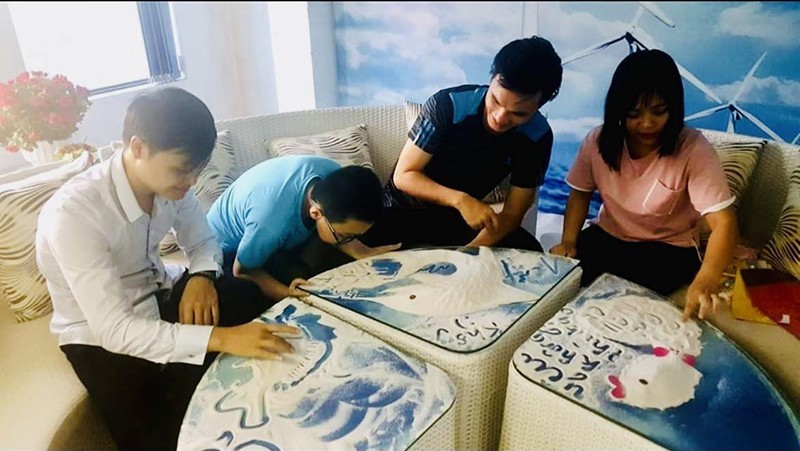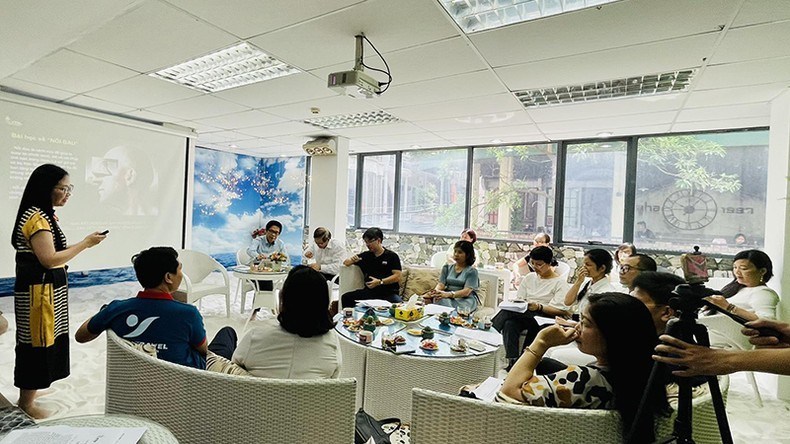Under the pressure of modern life’s hustle and bustle, the demand of experiencing trips which help regain mental and physical balance keeps increasing.

Tourists experience sandpainting at S-Happy Coffee
Especially, after the great fluctuations of the Covid-19 pandemic, this demand has increased over time. In recent times, wellness tourism is mentioned quite often and has become a trend chosen by many tourists.
Because wellness tourism is still quite new, so far, it still has no clear and unified definition. But wellness tourism can be understood as a type of tourism that is often integrated in an eco-resort model that combines health care and treatment, with many activities such as meditation, yoga, psychotherapy, traditional medicine diagnosis, macrobiotics enjoyment, etc.
Instead of travelling around beautiful roads or trying many interesting games at amusement parks, etc, wellness tourism tends to provide quieter services towards emotional refreshment, soul relaxation and positive life values.

Overview of a wellness tourism talk show organised by SIDe.
According to the President of the Scientific Union for Sustainable Tourism Development (STDe) Dr. Nguyen Thu Hanh, the waypoints of wellness tourism are often spaces with pristine nature, and various flora ecosystems, giving tourists a pure connection with nature.
At these places, tourists will have a chance to experience many activities such as taking herbal saunas, baths or foot baths, having their pulse checked, and meeting mental health experts and consultants, to relieve stress and have mind-body health recovered.
Experts say that there are many similarities in attributes between wellness tourism and some other types of tourism, such as medical tourism, wellness retreats, and spiritual tourism, but wellness tourism will lean towards taking care of emotions, soothing people's souls, and bringing positive energy to tourists.
Therefore, the subject of wellness tourism is relatively large, not only those who are suffering from psychological trauma, falling into depression after life's incidents in need of healing but also people who want to explore the inner spiritual world, take care of and nurture their mental health.
According to the Global Wellness Institute Report, by the end of 2022, the revenue of the wellness tourism segment has achieved about 919 billion USD, accounting for 18% of the world tourism industry's proportion.
The survey of the Wellness Tourism Association in 2022 also shows that up to 76% of respondents want to spend more on travel to improve their health, and 55% say they are willing to pay more for psychotherapy services and activities. These statistics are enough to confirm the attractiveness, as well as the abundant development potential of the wellness tourism market.
In many countries around the world, this type of tourism has been focused on developing with the introduction of many creativity models, such as meditation and yoga combining tours in India; middle-forest meditation tours in Jeju Island, Korea; healing trips with music, painting, animal care, etc, in some Western countries; specialised therapy tours for game addicts, workaholics, in Thailand.
By possessing rich and diverse natural resources, including many beaches, primaeval forests, hot mineral mud baths, a large number of pagodas and monasteries, and famous traditional medicine, Vietnam has many advantages to develop wellness tourism.
Sharing at the “Wellness tourism - Potentials, opportunities and solutions” talk show, organised by STDe, member of the National Assembly’s Economic Committee Commissioner Vu Tien Loc commented, that in the current background, Vietnam’s tourism industry needs to pay more attention to the quality of tourists, not the number of tourists. Hence, developing healing tourism is precisely the way to attract high-quality tourists, towards sustainable development, and contribute to overcoming the seasonality of tourism.
Recently, keeping up with this trend, there were several travel agencies, destinations and tourism businesses, which have implemented wellness tourism products to meet the needs of tourists.
Many typical tours have been organised, such as a healing tour at Medi Thien Son tourist attraction (Ba Vi, Hanoi), with many activities: meditation, yoga, psychological counselling, acupressure, macrobiotics, etc. The mindfulness lifestyle experience journey organised by Trung Nguyen Legend in Buon Ma Thuot (Dak Lak), includes archery, horseback riding, yoga, and a food-themed “mindful eating” activity, etc; or the healing tourism coffee model of S-Happy Coffee (Hanoi), with the experiential travel service “Finding happiness by yourself”, which shares how to live happily and provides tourism activities to explore nature, find joy, immerse in unique experiences such as sand painting, sand singing, sand dancing, and sand meditation.
However, according to experts, wellness tourism in Vietnam is just at the beginning stage, so it is not diverse and professional. Along with a few products distinctly focused on the healing aspect, the newest products are only leaning towards improving physical health such as massage, sauna, and foot baths, but do not yet specialise in mental health activities.
Discussing the difficulties and challenges that wellness tourism in Vietnam is now facing, Dr. Nguyen Thu Hanh said: Due to the limited awareness of wellness tourism's importance, this type of tourism has not had a national developing strategy and has not been invested in the right level.
Additionally, wellness tourism human resources are also lacking in quantity and quality, due to the lack of connection with medical experts and mental therapists.
From a scientific perspective, Associate Professor Doctor Bui Thanh Thuy - Head of Hanoi University of Culture Faculty of Tourism, commented: it is necessary to have a clear delineation of the “wellness tourism” definition to distinguish it from other similar types of tourism. This is the scientific basis for identifying the products, the environments and the service subjects for wellness tourism to have an appropriate development orientation.
Director of Viet Aspiration Tourism Company Nguyen Ba Toan shared the same opinion: Currently, there are many healing methods offered and applied but the effectivenesses is not fully verified.
Therefore, to promote the development of this type of potential tourism, management institutions need to research thoroughly the type and market characteristics of wellness tourism, provide specific instructions, design standard healing tours, announce the criteria that healing experts must meet, etc. They will be considered as a basis for companies and destinations to build and expand product development.
Trang Anh - Translated by NDO/Minh Phuong